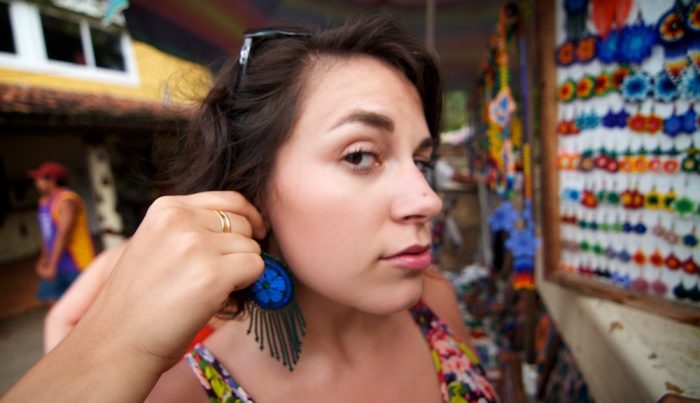What is eco-friendly jewelry?
As a jewelry designer who sells eco-friendly jewelry, I get asked this question a lot. And the answer is pretty neat.
For starters, “eco” is short for ecology, which is the system of relationships between living things and their environment. “Friendly” implies positive, or at least not harmful. So, if something is eco-friendly, it implies it has favorable effects on living things and their environment.
That being said, if you hear us or another jewelry, accessory, clothing, or shoe designer say that their goods are “eco-friendly,” or they are “eco-conscious,” you can assume that it means that the jewelry (or other) is made with positive intentions and is not causing harm to anyone or anything.
Here are 10 smart questions to ask before you buy eco-friendly or eco-conscious jewelry:
1. What materials is the jewelry made with?
This is the number one question to ask. If the jewelry is made with nature’s elements, such as rocks, crystals, or gemstones, you know you are in good hands. Why? Because these elements are abundantly available, so they don’t cause harm when taken from the Earth. On the contrary, if the jewels are made with man-made materials like plastic, you are certainly not getting eco-friendly goods.
2. Is the jewelry handmade?
If the answer is yes, bravo. There are a couple of reasons this is an important question, the first being that when jewelry is made by hand, it creates more jobs, which helps employment, which in turn helps people. The second reason is that when jewelry is handmade, it lessens the carbon footprint (the amount of carbon dioxide and other carbon compounds emitted due to the consumption of fossil fuels by a particular person or group), because, unlike mass-produced jewelry that is made with heavy machinery that causes carbon emissions (carbon dioxide that planes, cars, factories produce), making jewelry by hand will not directly contribute to air, land, or water pollution, or overall global warming.
3. Where is the jewelry made?
The answer to this question piggy-backs off the former question, because if the jewelry is made within the city, state, or country in which it is sold, there will be less of a carbon footprint, because fewer fossil fuels (natural fuel such as coal or gas, formed in the geological past from the remains of living organisms) will be used in transport of the goods. For example, if a jewelry designer buys materials from a local source, the transportation time and impact on the environment will be less than if the jeweler buys their goods from an overseas vendor.
4. Do you use dyes?
A good question to ask, because unless the dyes are organic, you want an affirmative “No” response. Dyes are colored substances that chemically bond to the article it is being applied, so if the jewelry is dyed, it becomes tarnished with chemicals that are harmful to the wearer and the environment if and when discarded.
5. Does your company abide by labor laws?
You want a big ol’ “yes” here. You want the company you are buying from to be socially responsible and to abide by labor laws so you know that everyone is treated fairly and is safe from harm.
6. How are your products packaged?
The packaging is just as important as the product it holds. That being said, you want to hear that the company uses eco-friendly packaging, such as recycled, which means to convert waste into reusable material, or up-cycled, a term knows as creative reuse. A good example of eco-friendly jewelry packaging would be recycled cardboard boxes, up-cycled sari ribbons, or jute and hemp pouches.
7. How do you ship your items?
This is a gray area, because most means of carrier transportation contribute to global warming, except, of course, if a package is delivered by foot, bike, or in an electric vehicle—but that is not always realistic. The best bet would be to ask the company you are thinking of ordering from what method they use. We can also hope that with advancements in technology, we will have more green ways of transporting in a timely fashion.
8. Does your company have a give-back component?
I love this question, because I believe that you give what you get and charity is part of the bigger picture. At my jewelry company, we can proudly say yes. We donate a portion of its sales to Oceana; a 501(c)(3) whose mission is protecting and preserving our world’s oceans. We donate to this cause because of my love of the ocean, and our oceans need our help, plus it just makes me feel good.
9. Where do you sell your products?
I believe this is an important question, because partnerships and affiliations can say a lot about a company’s core values and integrity. I believe a company can choose to either be in good company, or not. There’s a saying that goes something like, we are a combination of the five people we spend the most time with, and I believe the same applies in business relations. For example, if a jewelry company sells its goods on Amazon, I believe they are doing a disservice to themselves and the whole because they are only feeding the monopolizing beast, as I like to call it (we can talk more about this later). Whereas, if a company is selling its goods in its own brick-and-mortar store, or on its own e-commerce platform, or in retail store affiliates that are socially responsible, I believe this is helping the greater good.
10. Whom did you vote for?
I’m just teasing—or am I?







Read 0 comments and reply